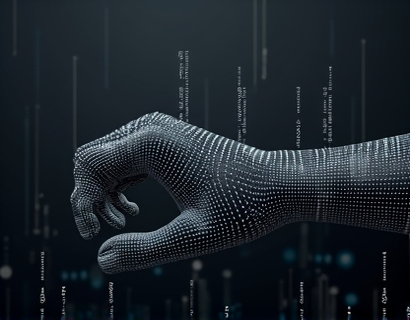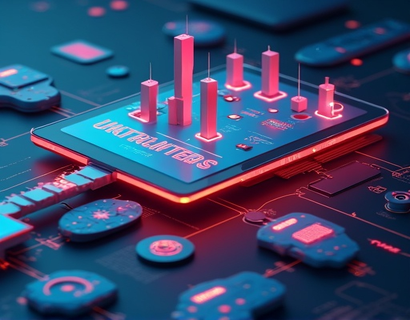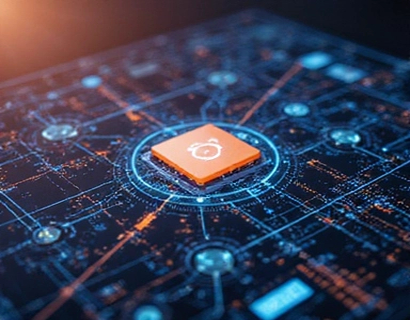Crypto AI: Enhancing Digital Journeys with Advanced Tech Solutions
The integration of cryptocurrency and artificial intelligence (AI) is revolutionizing the digital landscape, offering unprecedented opportunities for innovation and enhanced user experiences. This article delves into the transformative impact of merging these two cutting-edge technologies, focusing on how they are reshaping digital interactions and driving forward the evolution of applications and services. For tech professionals and early adopters interested in the intersection of crypto and AI, this exploration provides valuable insights into the future of digital journeys.
The convergence of cryptocurrency and AI is not just a technological curiosity but a practical approach to creating more secure, efficient, and personalized digital experiences. Cryptocurrency, with its decentralized and transparent nature, provides a robust foundation for building trust and security in digital transactions. Meanwhile, AI's ability to analyze vast amounts of data and learn from patterns enables the creation of intelligent systems that can adapt and improve over time. When combined, these technologies offer a powerful toolkit for enhancing various aspects of digital interactions.
Security and Trust in Digital Transactions
One of the primary benefits of integrating cryptocurrency with AI is the significant enhancement in security and trust. Cryptocurrencies, particularly those built on blockchain technology, offer a level of security that traditional digital systems often lack. The decentralized nature of blockchain ensures that no single entity has control over the entire network, reducing the risk of centralized failures and cyber attacks. AI can further bolster this security by continuously monitoring transactions and network activity, identifying and mitigating potential threats in real-time.
For instance, AI-driven systems can detect anomalies in transaction patterns, flagging suspicious activities that might indicate fraud or malicious behavior. Machine learning algorithms can be trained to recognize normal user behavior and automatically adjust security protocols based on real-time data. This dynamic approach to security not only protects users' assets but also builds a higher level of trust in digital platforms. In an era where data breaches and cybercrime are increasingly common, the combination of cryptocurrency and AI provides a robust defense mechanism.
Personalization and User Experience
AI's strength lies in its ability to personalize experiences based on individual preferences and behaviors. When applied to digital platforms that utilize cryptocurrency, this personalization can be taken to new heights. By analyzing user data and transaction history, AI systems can tailor recommendations, offers, and services to each user, creating a more engaging and relevant digital journey. This level of personalization not only enhances user satisfaction but also increases the likelihood of user retention and engagement.
For example, a digital marketplace that accepts cryptocurrency payments can use AI to analyze a user's purchase history and browsing behavior to suggest products or services that align with their interests. This not only streamlines the shopping experience but also increases the chances of conversion. Additionally, AI can optimize the user interface and navigation based on user preferences, making the platform more intuitive and user-friendly. The result is a seamless and personalized digital experience that keeps users coming back.
Efficient and Smart Contracts
Smart contracts, self-executing contracts with the terms directly written into code, are another area where the combination of cryptocurrency and AI shines. These contracts can automate and enforce agreements without the need for intermediaries, reducing costs and increasing efficiency. AI can enhance smart contracts by providing intelligent logic and decision-making capabilities, making them more adaptable and responsive to changing conditions.
For instance, in supply chain management, smart contracts can be used to automate payments and verify the authenticity of goods. AI can analyze data from various sources, such as sensors and transaction records, to ensure that all conditions of the smart contract are met. If a shipment is delayed or a product is found to be counterfeit, the AI system can automatically trigger the appropriate actions, such as holding payment or initiating a refund. This level of automation and intelligence not only streamlines processes but also reduces the potential for human error.
Enhanced Data Analytics and Insights
The integration of AI with cryptocurrency-driven platforms provides unparalleled data analytics capabilities. The vast amount of data generated by cryptocurrency transactions and user interactions can be harnessed to gain deep insights into user behavior, market trends, and system performance. AI algorithms can process and analyze this data in real-time, providing actionable insights that can inform strategic decisions and drive innovation.
For example, a financial service provider that accepts cryptocurrency payments can use AI to analyze transaction data to identify patterns and trends in user spending habits. This information can be used to develop new financial products or services that better meet the needs of users. Additionally, AI can help in risk assessment and management by identifying potential fraud or financial instability early on, allowing for proactive measures to be taken. The combination of cryptocurrency and AI thus creates a powerful tool for data-driven decision-making.
Interoperability and Cross-Platform Integration
Another significant advantage of merging cryptocurrency and AI is the enhancement of interoperability and cross-platform integration. Cryptocurrencies facilitate seamless transactions across different platforms and systems, while AI can bridge the gaps between disparate technologies, ensuring smooth and efficient interactions. This interoperability is crucial in a world where users expect a cohesive and connected digital experience.
For instance, AI can enable the development of decentralized applications (dApps) that work across multiple blockchain networks, providing users with a unified and seamless experience. AI-driven middleware can translate and synchronize data between different systems, ensuring compatibility and consistency. This not only simplifies the user experience but also opens up new possibilities for collaboration and innovation among different platforms and services.
Challenges and Considerations
While the potential benefits of combining cryptocurrency and AI are substantial, there are also challenges and considerations that must be addressed. One of the primary concerns is the regulatory landscape, which is still evolving and varies significantly across different regions. Ensuring compliance with local laws and regulations is crucial for the successful implementation of these technologies. Additionally, the volatility of cryptocurrency markets can pose financial risks, and careful risk management strategies are necessary.
Technical challenges, such as scalability and interoperability, also need to be overcome. As the number of users and transactions grows, ensuring that systems can handle the load without compromising performance is essential. Furthermore, the complexity of integrating AI with blockchain technology requires skilled professionals who can navigate the technical intricacies and ensure seamless integration.
Future Prospects
Looking ahead, the future of cryptocurrency and AI is promising, with numerous potential applications and innovations on the horizon. As the technology matures and more use cases are explored, we can expect to see even more sophisticated and integrated solutions. The development of more advanced AI algorithms, improved blockchain scalability, and increased adoption of decentralized technologies will continue to drive this evolution.
One exciting area is the integration of AI with decentralized finance (DeFi) platforms, which can lead to more accessible and inclusive financial services. AI can enhance risk assessment, fraud detection, and personalized financial advice, making DeFi more user-friendly and reliable. Additionally, the combination of cryptocurrency and AI can revolutionize industries such as healthcare, supply chain, and entertainment, by providing secure, efficient, and personalized solutions.
In conclusion, the merging of cryptocurrency and AI represents a significant leap forward in digital technology, offering enhanced security, personalization, efficiency, and innovation. For tech professionals and early adopters, this intersection presents a wealth of opportunities to explore and contribute to the next generation of digital experiences. As the technology continues to evolve, staying informed and adaptable will be key to harnessing its full potential.










































